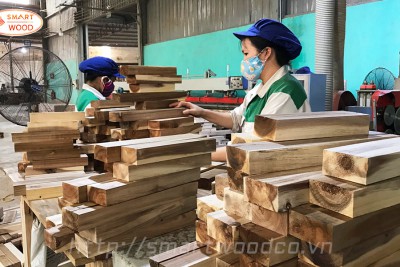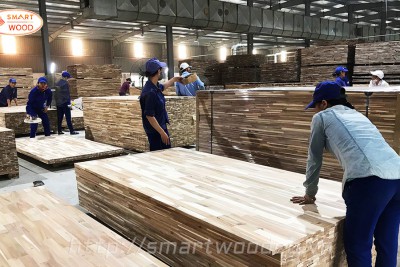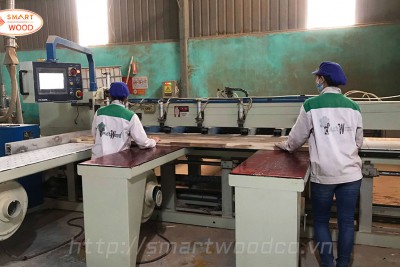The US-China trade war has a strong impact on the Vietnamese wood industry Nam
Despite being strongly affected by the US-China trade war, the Vietnamese wood industry is still trying to achieve an export turnover of 9 billion USD in 2018.
Vietnam's wood processing and forest products export industry sets a target of reaching $9 billion in 2018, becoming one of the seven industries with the largest export value, and by 2025, this figure is expected to reach 25 billion USD.
According to data from the Import-Export Department (Ministry of Industry and Trade), Vietnam's exports of wood and wood products in September 2018 were estimated at $680 million, bringing the export value in the first nine months of 2018 to 6.34 billion. USD, up 13.9% over the same period in 2017. In which, the export value of wood products in 9 months of 2018 was estimated at 4.42 billion USD, up 6.4% over the same period in 2017.
.jpg)
Experts and businesses in the wood industry said that the export of wood and wood products will continue to grow well in the last months of this year thanks to stable demand in markets. However, the US-China trade war will have a significant impact on the Vietnamese wood industry because both China and the US are important markets for Vietnamese wood exports.
The trade tension between the US and China is forecasted to have a direct impact on the export situation of Vietnam's wood and wood products industry in the near future. (Illustration)
Statistics show that the supply of smallholder rubber to the market accounts for about 61.1%. The supply of smallholder rubber wood is small, but in the future, because the smallholder rubber area is larger than the big one, the supply of wood will also become an extremely important source. According to Dr. To Xuan Phuc, expert on forestry and timber trade - senior advisor of Forest Trends, the rubber industry has two sources of rubber, namely big rubber and smallholder rubber. An extremely large amount of smallholder rubber is participating in the rubber supply and later on, smallholder rubber will become a very important source of wood for the timber industry.
Up to now, the main export products of the rubber industry are still raw products, with exported natural rubber accounting for over 80% of total export volume. Processed products account for only about 17-18%. This greatly affects the profit in exporting products of Vietnam's rubber industry.
Mr. To Xuan Phuc said that at present, FDI enterprises play an important role in the production, processing and export of rubber and bring in the highest added value. It seems that Vietnamese private enterprises have not paid much attention to this.
According to a report by Forest Trends, in the first 6 months of 2018, the total volume of Vietnamese sawn timber exported to China was only about 88,800 m3, much lower than the figure of 178,200 m3 in the same period of 2017. Especially, The amount of sawn rubber wood exported to China decreased very deeply, only about 2,500 m3, equivalent to over 1% of the export volume of 2017.
Mr. Nguyen Vinh Quang, an expert at Forest Trends, said that this significant decrease may be the response of Chinese wood processing enterprises when the wood products they produce have difficulty accessing the US market. due to the new tax rate).
Because, wooden products are among Chinese goods that are taxed by the US in the trade war between these two countries. With the new tax rate from 10-25%, it will definitely affect wood products imported from China to the US.
However, the US's high tax on Chinese wood products may benefit Vietnamese wood processing enterprises. Currently, nearly 50% of the value of American wooden furniture is imported from China. With the new tariffs, US importers will limit the import of wooden furniture from China.
To avoid risks, it is likely that US importers will redirect orders to other regions in Southeast Asia such as Vietnam. This will be an opportunity for the Vietnamese furniture industry.
Reality from businesses also clearly shows this trend. Many businesses said that export orders to the US are trending up recently.
Mr. Dien Quang Hiep, Chairman of Binh Duong Woodworking Association (BIFA), said that currently, Vietnamese wood processing enterprises have great opportunities in accessing the US market.
This is reflected in the increasing number of US customers looking to Vietnamese businesses in recent times. Instead of cooperating with Chinese businesses as before, they now seek and access information and prefer to work with Vietnamese businesses.
However, Mr. Diep said, the US is a market that requires clear standards. To make good use of this opportunity, businesses must not only meet the technical requirements but also understand the consumer culture.
On the other hand, any great opportunity always comes with corresponding risks and challenges, so the Vietnamese wood industry needs to be more active in this "playground".
At that time, with the law against tax evasion, the US will monitor this issue. In case it is discovered that a Vietnamese enterprise "helps", Vietnamese wood products will be subject to this law with an increased tax rate of 10% or more.
With the export market share to the US accounting for 42.7% of the total export value of wood and forest products (2017 data) and being the largest import market of the wood processing industry today, the imposition of tax This will cause huge damage to the industry. Therefore, wood businesses need to be deeply aware of this issue, to avoid being damaged like the steel industry.
However, this war may lead to a shift in investment in Vietnam's wood processing industry from enterprises from China and may lead to negative impacts on Vietnam's wood industry ( happened to the steel industry).
“Vietnam is currently inheriting a golden opportunity in this war, the question is whether we are really connected, if so, then the opportunity will turn into gold, otherwise the opportunity will only exist on paper. ", Chairman of Binh Duong Love Woodworking Association noted.









AAdministratorsAdministrators
Xin chào quý khách. Quý khách hãy để lại bình luận, chúng tôi sẽ phản hồi sớm